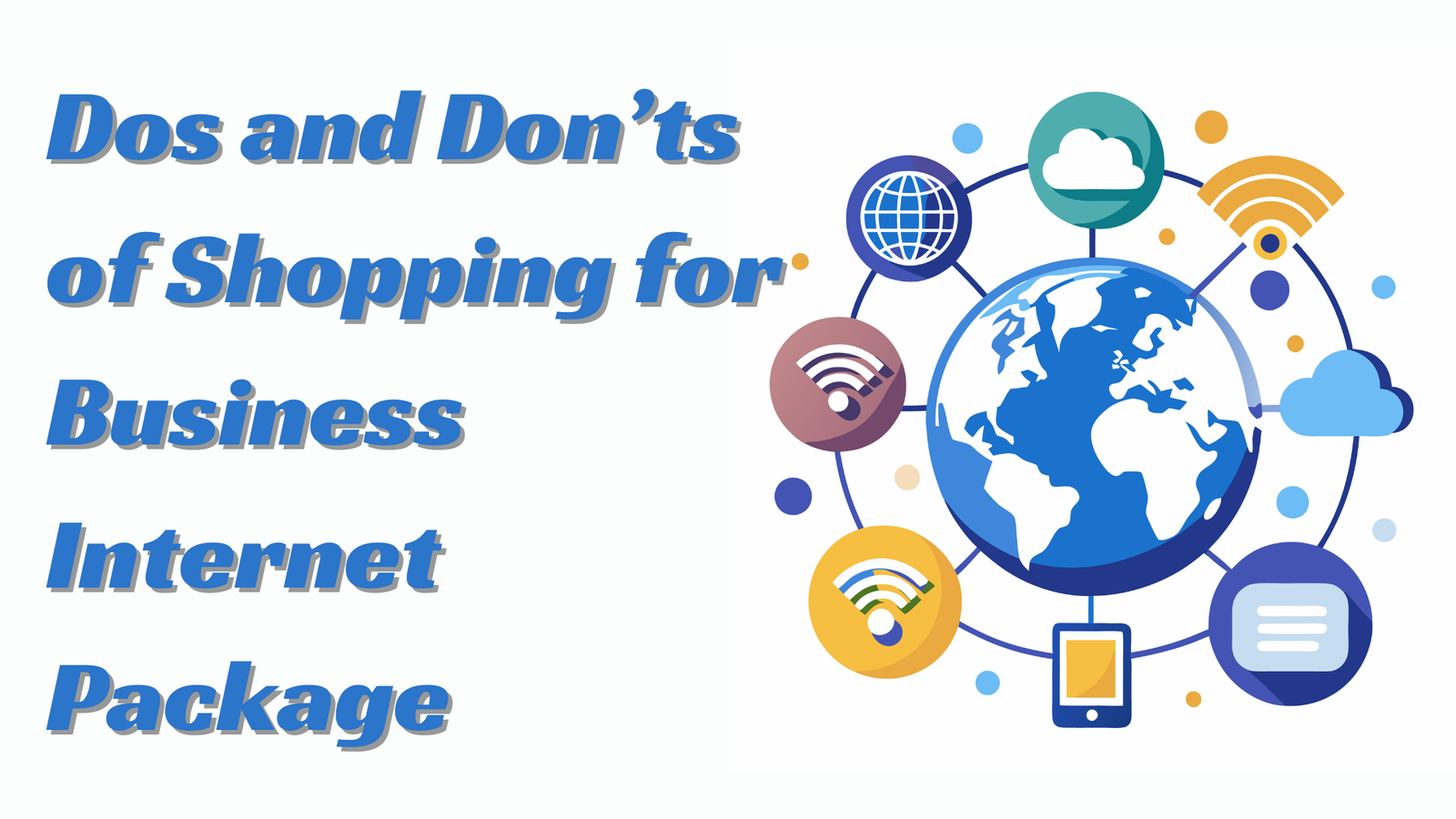The Dos and Don’ts of Shopping for a Business Internet Package
- 1 The Dos of Shopping for a Business Internet Package
- 1.1 1. Do Assess Your Business Needs
- 1.2 2. Do Prioritize Reliability
- 1.3 3. Do Consider Customer Support
- 1.4 4. Do Compare Contracts and Costs
- 1.5 5. Do Focus on Speed and Bandwidth
- 2 The Don’ts of Shopping for a Business Internet Package
- 2.1 1. Don’t Skimp on Bandwidth
- 2.2 2. Don’t Ignore Security
- 2.3 3. Don’t Rely Solely on Price
- 2.4 4. Don’t Overlook Scalability
- 3 Conclusion
When shopping for a business internet package, finding the right balance between speed, reliability, and cost is essential. Unlike residential internet services, business-grade internet is designed to meet more demanding usage needs, often with added features like enhanced customer support, service level agreements (SLAs), and security measures. However, navigating the plethora of available options can be overwhelming. Whether you’re a small business owner or managing a larger enterprise, making the right choice is crucial to ensure seamless operations. This guide will walk you through the dos and don’ts of selecting the perfect business internet package.
The Dos of Shopping for a Business Internet Package
1. Do Assess Your Business Needs
Start by evaluating your current and future internet requirements. A small business with a few employees might only need basic connectivity. Still, larger teams or internet-heavy tasks like video conferencing, data backups, or streaming will require more robust solutions. It’s essential to understand your usage patterns to avoid overpaying for services you don’t need or underestimating your bandwidth requirements.
- Number of employees: Each employee adds more demand on bandwidth, especially if multiple users are online at the same time.
- Type of work: Businesses in industries like graphic design, media production, or IT development tend to require high-speed connections capable of handling large data transfers and real-time communication tools like Slack, Zoom, or Microsoft Teams.
- Cloud-based services: If your business relies on cloud-based applications for file storage, collaboration, or data management, a high-speed connection with low latency will be critical for smooth performance.
By understanding your specific needs, you can ensure that the internet package you choose aligns with your operational goals.
2. Do Prioritize Reliability
For businesses, internet reliability is non-negotiable. Even minor downtime can result in lost productivity, missed opportunities, and dissatisfied customers. When shopping for a business internet package, prioritize providers that offer high levels of uptime.
- Look for SLAs (Service Level Agreements): A good SLA will guarantee a certain level of uptime, typically 99.9% or higher, ensuring minimal downtime.
- Redundancy and backup options: Ask providers about backup connections or failover systems in case of primary network failure. This will ensure that your business remains operational even during outages.
3. Do Consider Customer Support
Responsive customer support can be a lifesaver when things go wrong. For businesses, losing internet connectivity during peak hours can be detrimental, making fast and reliable technical support a necessity.
- 24/7 support: Look for providers that offer round-the-clock support and a dedicated team for business customers. This ensures that issues are addressed swiftly, minimizing disruptions.
- Support channels: Ensure the provider offers multiple support channels like phone, email, chat, and onsite technical help.
4. Do Compare Contracts and Costs
Price should always be a consideration, but not the only one. Take time to compare different providers, their packages, and associated costs. Don’t just jump on the first deal that looks attractive.
- Hidden fees and additional costs: Watch for any extra fees for equipment rental, installation, or early termination.
- Discounts for bundling services: Some providers offer discounts when you bundle services like VoIP phone systems, cloud storage, or managed IT services with your internet package.
- Long-term contracts vs. flexibility: Determine whether a contract offers any flexibility for upgrading or downgrading services without hefty fees.
5. Do Focus on Speed and Bandwidth
The speed of your internet connection directly affects how efficiently your business operates. Bandwidth, which refers to the volume of data that can be transmitted over your internet connection in a given period, is a key factor in determining the speed of your internet. Some providers like Frontier may offer discounts for bundling services like phone or cloud storage, while others might include free installation or lower costs for higher-tier plans. Be sure to read the fine print to avoid unexpected expenses.
- Download vs. upload speed: For some businesses, upload speed (the speed at which you can send data from your network) is just as important as download speed. This is particularly true for businesses that engage in data-intensive tasks like video conferencing, uploading large files, or using cloud storage.
- Scalability: Opt for packages that allow you to scale up as your business grows. This flexibility will prevent you from having to switch providers in the future when your internet needs increase.
The Don’ts of Shopping for a Business Internet Package
1. Don’t Skimp on Bandwidth
Underestimating your bandwidth needs can be a costly mistake. If your internet connection is slow, employees will face productivity bottlenecks, especially if you run an office where multiple users are accessing bandwidth-heavy applications simultaneously.
- Plan for growth: Even if your current needs are modest, choose a package with some room for future growth. The last thing you want is to outgrow your internet plan within a few months, leading to costly upgrades.
- Account for peak usage times: If your business has specific times when everyone is online (e.g., around meetings or data backup schedules), ensure your connection can handle the demand without slowing down.
2. Don’t Ignore Security
Cybersecurity is a paramount concern for businesses. In the age of data breaches and ransomware, it’s essential to ensure that your business internet package includes adequate security measures.
- Firewalls and anti-malware protections: These should be included to prevent unauthorized access and protect your network from malicious attacks.
- DDoS protection: Distributed denial-of-service (DDoS) attacks can overwhelm your network with traffic and render it useless. Many internet providers now offer DDoS protection as part of their service packages.
- Encrypted connections: Look for providers that offer Virtual Private Network (VPN) services or encrypted connections to keep your business data secure, especially if you have remote employees.
3. Don’t Rely Solely on Price
While cost is important, focusing solely on the cheapest option can be detrimental in the long run. Cheaper packages may offer slower speeds, less reliable service, or poor customer support, all of which can lead to operational headaches.
- Balance price and quality: Make sure the package you choose provides value for money. Don’t sacrifice essential features like speed, security, or uptime to save a few dollars.
- Long-term costs: Consider the total cost of ownership, including any future costs for upgrading, downgrading, or extending your contract.
4. Don’t Overlook Scalability
Many businesses focus on their immediate needs without considering how those needs might change in the future. Internet usage tends to grow as companies expand, so it’s essential to choose a provider that offers flexible, scalable solutions.
- Avoid rigid contracts: Choose a provider that allows for bandwidth upgrades or plan adjustments without incurring heavy fees.
- Plan for new technologies: As your business embraces new technologies like IoT devices, AI-driven platforms, or advanced cloud services, your internet package should be able to support those future demands.
Conclusion
Selecting the right business internet package requires careful consideration of your current needs and future growth. By following these dos and don’ts, you can avoid common pitfalls and make a well-informed decision that sets your business up for success. Balancing speed, reliability, cost, security, and customer support will ensure that your internet connection empowers your business operations rather than hindering them.
Take the time to research, compare options, and evaluate providers to ensure you choose a package that provides both value and peace of mind. In the fast-paced digital world, having a reliable and secure internet connection isn’t just a luxury—it’s a necessity for any successful business.

















